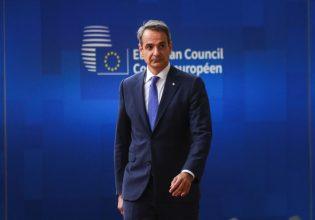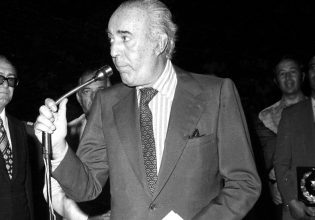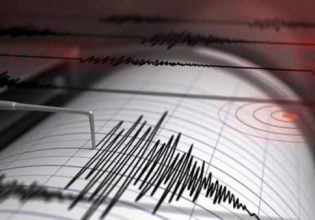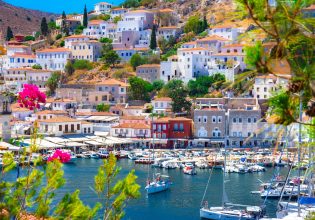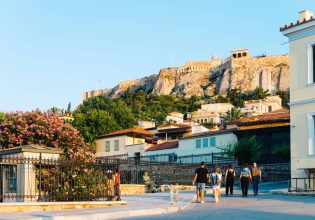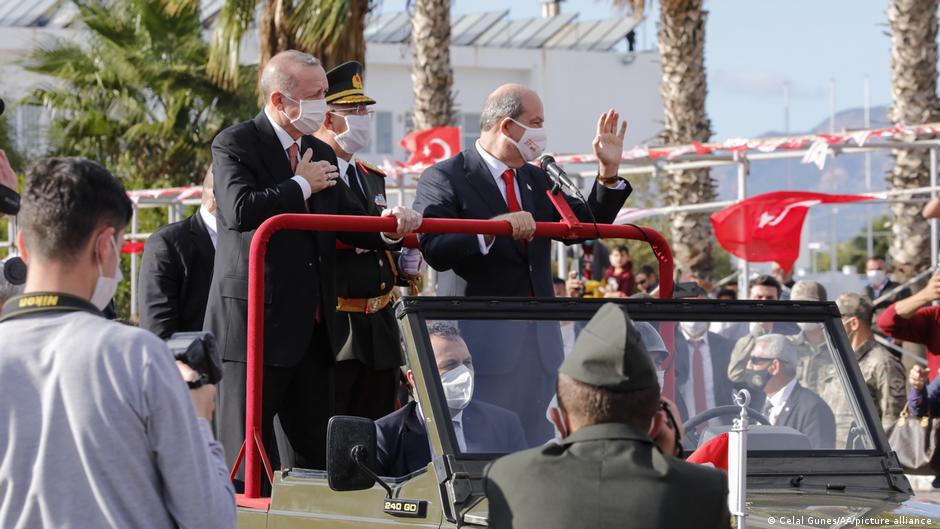
Defying US, EU pressures Erdogan trumpets support for two-state solution on visit to Turkish-occupied Cyprus
Some analysts believe Erdogan’s maximalist position in support of a two-state solution is designed to achieve a loose confederation, (effectively Ankara’s position in prior settlement talks), definitively abandoning the UN's bi-zonal federation framework.
By George Gilson
Exactly 47 years after Turkey’s invasion of Cyprus, Turkish President Recep Tayyip Erdogan arrived in the Turkish-occupied Cyprus to celebrate the invasion that led to the occupation of 40 percent of the island and the ethnic cleansing of the north, leaving 200,000 Greek Cypriots refugees in their own land.
The visit comes three months after the failed, informal five-way UN-sponsored talks in Geneva (the Republic of Cyprus, Turkish-Cypriot leader Ersin Tatar, Greece and Turkey plus UN Secretary Antonio Guterres) which reached a deadlock due to the intransigent position of Ankara and Tatar demanding a two-state solution, which is to say a final, de jure partition of the island through international recognition of the breakaway state – “Turkish Republic of Northern Cyprus”- created by Ankara in the occupied north in November,1983.
Turkey, whose economy is in dire straits, is the only country in the world that recognises it and it depends entirely on Ankara – which keeps 40,000 occupation troops on the island – for its very economic survival.
In the years after the occupation a very high percentage of the Turkish Cypriots emigrated to the UK and other countries due to the insufferable socio-economic conditions in the occupied territories, and the original Turkish Cypriots and their descendants now constitute less than half of the population.
The two-state solution that Erdogan trumpeted today in his address to the “legislature” of the secessionist state is a total departure from the solution of a bi-zonal, bi-communal federation that has been agreed upon objective the Greek Cypriot and Turkish Cypriot sides in over four decades of UN-sponsored talks and has been enshrined in a host of UN Security Council resolutions.
Turkey’s entirely unprecedented maximalist position – which is intimately connected with Ankara’s demand for half of the island’s rich gas and oil deposits – has been accompanied by the threat of Erdogan and Tatar to re-open and commercially exploit the fenced off coastal city of Varosha, which from the start of settlement talks in the mid-1970’s was viewed by Ankara and international players as a bargaining chip for the endgame of negotiations.
The 30,000 Greek Cypriot residents of Varosha, the heart of Cyprus’ pre-occupation tourism industry, fled after the Turkish invasion, and Ankara’s supposed plan to re-open it provides for an invitation to its legal residents and their descendants to return and live under the occupation regime
That trial balloon appears to have been burst, for now, by strong US and EU pressure.
American rain on Erdogan’s planned Varosha parade
A spate of press reports today indicated that Erdogan canceled plans for a grandiose appearance there tomorrow, on the 20 July anniversary of the invasion, after the 16 July telephone communication between Ibrahim Kalin, Erdogan’s chief advisor and spokesman and US National Security Advisor Jake Sullivan.
That remains to be seen.
The White House readout of the conversation was as follows: “National Security Advisor Jake Sullivan spoke by phone today with Ibrahim Kalin, Spokesperson and Chief Advisor to the President of Turkey. Following the meeting between President Joe Biden and President Recep Tayyip Erdogan on June 14, Mr. Sullivan and Dr. Kalin discussed a range of regional issues.”
The EU has also strongly expressed its consternation over Ankara’s pronouncements about a two-state solution, and European Commission President Ursula van der Leyen made that clear in a conversation with Erdogan two weeks ago, as preparations for his visit to Cyprus were underway.
“I told him that we are very sensitive in this matter, that we will monitor the progress of this visit and that it is absolutely clear that the EU will never accept anything that refers to the two-state solution,” she said.
Turkey aiming for a confederation?
Some seasoned diplomats and analysts in Cyprus and Greece, such as ruling New Democracy MP and former Greek foreign ministry spokesman Yorgos Koumoutsakos, have argued that Erdogan’s maximalist position in support of a two-state solution is in fact designed to achieve a loose confederation, that has effectively been Ankara’s position in prior settlement talks, in substance but a federation (in accord with UNSC resolutions) only in name.
- Εξάρχεια: 22χρονη παρολίγον θύμα βιασμού – Περαστικοί ακινητοποίησαν τον δράστη
- «Μην το βάζετε κάτω, η ζωή έχει έναν δρόμο για όλους» – Συγκίνησε για μια ακόμα φορά ο μικρός Γιαννάκης
- Χαλκιδική: Διέφυγε τον κίνδυνο η 46χρονη αστυνομικός που τραυματίστηκε στη φονική παράσυρση
- Εκδικητική η «ροζ» καταγγελία για τη νεαρή αστυνομικό, λέει το περιβάλλον της – «Μάλλον είναι από τον πρώην της»
- Μεγάλη Βρετανία: Ποινή 15 ετών σε 14χρονη που μαχαίρωσε δύο καθηγήτριες και συμμαθήτριά της
- Η ραγισμένη καρδιά του Banksy εκτίθεται στη Νέα Υόρκη λίγο πριν βγει σε δημοπρασία για καλό σκοπό
